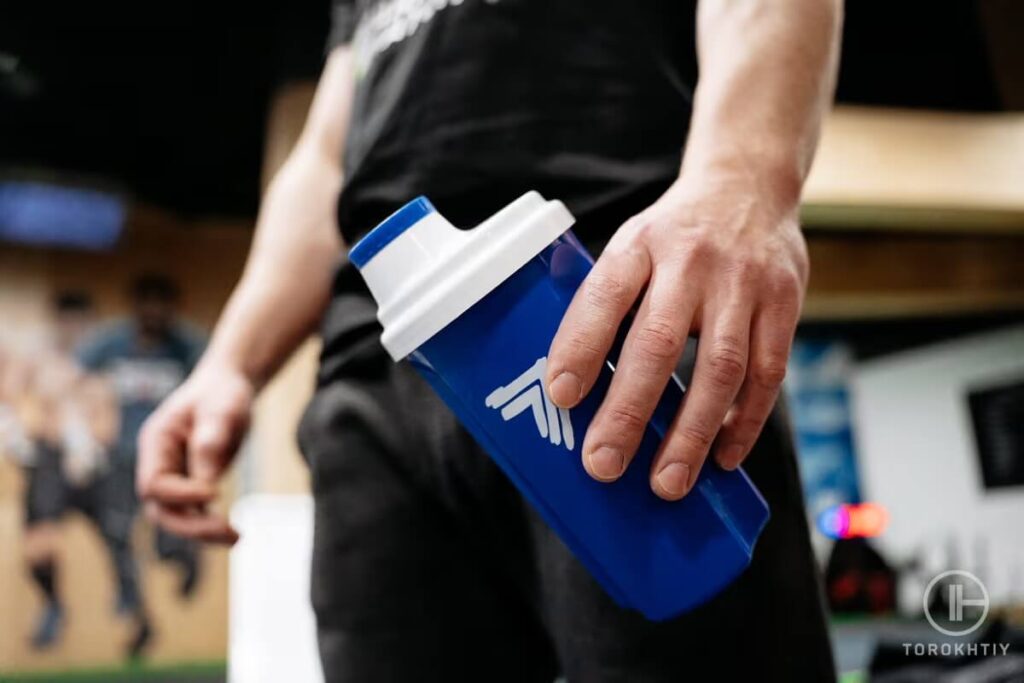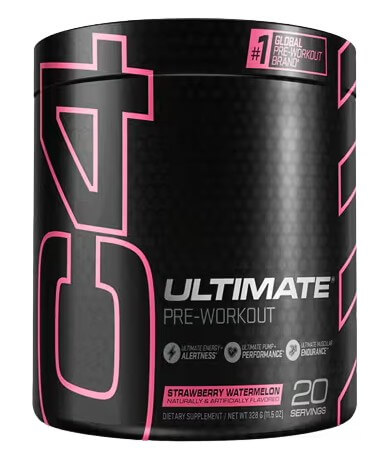How Many Calories in Pre-Workout?
Author:
Unlock your full potential by engaging with our experts and community! Have questions about your fitness journey or looking for expert advice on weightlifting techniques? Don’t hesitate — leave a comment below and Oleksandr Maksymenko will provide a personalized answer and insights to help you reach your goals.
Torokhtiy is reader-supported. Some links are affiliate links, and we may earn a commission at no extra cost to you. See our disclosure page for details.
Whether you are an athlete looking to take your performance to the next level or someone interested in building strength and maintaining good health, introducing pre-workouts to your fitness regimen can help you get the results you want. How many calories in pre-workout? Let’s find out!
How many calories in pre workout? Pre-workout supplements usually contain very few to no calories, most are designed to not interfere with fat loss or other dietary goals. However, there are also supplements that contain a significant amount of calories, so be careful choosing a pre-workout!
This article gives you the lowdown on pre-workout calories and ingredients- plus my personal recommendation.

What Are Pre-Workouts?
Pre-workout supplements are divided in two types: stimulant-based and non-stimulant-based.
Stimulant-based supplements contain ingredients like caffeine that stimulate brain activity and increase adrenaline production for better performance.
Non-stimulant-basedpre-workouts contain ingredients like creatine and beta-alanine that maximize muscle growth, improve blood flow and increase energy levels.
The effects of pre-workout supplements can be felt approximately 30 minutes after consumption.
1. What Determines the Calories in a Pre-workout?
So, does a pre-workout have calories? Usually, yes. Although there are also low (even zero) calorie options available. The exact number of calories in a pre-workout supplement is determined by the ingredients used.
The amount of each ingredient and the serving size of the supplement will also affect the number of calories per serving.
It’s important to read the nutrition label and ingredient list carefully to determine the calorie content of a pre-workout supplement.

2. The Most Common Ingredients in a Pre-workout
The most common ingredients present in pre-workouts are:
- Caffeine: Caffeine is a stimulant that increases brain activity, alertness and focus. It promotes the circulation of chemicals like adrenaline and cortisol in the body. Caffeine can increase energy levels, reduce fatigue during exercise and increase metabolism.
- Creatine: Creatine is a compound produced naturally in the body that can help increase muscle strength, muscle growth, and promote recovery. This naturally occurring compound is stored mainly in the skeletal muscles. However, athletes often supplement further, and low doses can be found in pre-workout complexes.
- Nitric oxide precursors: Nitric oxide is another compound produced naturally by the body to enhance blood flow. L-arginine and L-citrulline in pre-workout supplements are used by the body to make nitric oxide which as a result relaxes the blood vessels making way for more blood (carrying nutrients) and oxygen to get pumped in to the muscles.
- Branched-chain amino acids (BCAAs): BCAAs include three essential amino acids – leucine, isoleucine, and valine. These amino acids are not naturally made in the body and can only be obtained through food or supplements. Branched-chain amino acids can reduce muscle soreness, promote the building and repairing of muscle tissue, and delay fatigue during high-intensity exercise.
- Beta-alanine: Beta-alanine is a non-essential amino acid used in pre-workouts to improve athletic performance and delay the onset of muscle fatigue during workouts, which allows you to train harder for longer. This ingredient in pre-workouts increases the levels of carnosine in muscles which acts as a buffer to reduce acid build-up in muscles responsible for fatigue.
3. How Many Calories Does Pre Workout Have?
The number of calories in a pre-workout supplement can vary depending on the brand, formulation, and serving size. Generally, pre-workout supplements contain anywhere from zero to 200 calories per serving.
Some products are designed to be low-calorie, while others may be higher in calories due to added ingredients like carbohydrates or protein. The choice depends on your goals. For example, during weight loss, it is better to choose a low-calorie supplement, but during weight gain or if you have a hard, long workout, a few extra calories won’t hurt or even be helpful.
It’s important to read the nutrition label and serving size information carefully to determine the calorie content of a specific pre-workout supplement.
My Recommendation
I’m a big fan of Cellular C4 Ultimate, it gives me everything I personally look for in a pre-workout.
I get the caffeine kick from 300mg, the beta-alanine to help me power through those last reps when my body is crying for me to stop, and I love the pump I get off the dual creatines after. Only 5 calories per serving make this product suitable for any purpose.
Plus, it’s totally free from artificial dyes or flavours. Not a deal-breaker, but definitely a bonus.
FAQ
Does Pre-workout Have Calories?
Usually a fairly low amount, but the exact amount depends on the type of pre-workout, its ingredients, and the serving size.
Is 400 Calories Good for a Pre-workout?
400 calories are at the higher end of the scale. Whether it’s ‘good’ or ‘bad’ will depend on your individual goals. If you’re gaining weight and have trouble consuming enough calories, or have a very long and hard workout ahead of you, this might work for you. But in most cases, choosing a supplement with a lower calorie content is better.
Conclusion
We hope this article has given you some useful information on pre-workouts. Seriously, whatever your goal is, they can help you get there. Just be careful with the high-caffeine options if you have any heart issues. But that’s just common sense!
Good luck, and please feel free to comment or ask any questions below!
Also read:
- Stim vs Non Stim Pre Workout
- Pre Workout With No Artificial Sweeteners
- Can Pre Workout Make You Gain Weight
- What to Mix With Pre Workout
- Does Pre Workout Have Caffeine
- Should You Take Pre Workout Before Running
- Best Healthy Pre Workout Drink
- Nitric Oxide Supplements Guide
- What Is Non Stim Pre Workout
- Does Pre Workout Help Build Muscle
References:
- Creatine Supplementation for Muscle Growth: A Scoping Review of Randomized Clinical Trials from 2012 to 2021 // Ncbi: https://www.ncbi.nlm.nih.gov/pmc/articles/PMC8949037/
- DIETARY NITRIC OXIDE PRECURSORS AND EXERCISE PERFORMANCE // Gssiweb: https://www.gssiweb.org/sports-science-exchange/article/sse-156-dietary-nitric-oxide-precursors-and-exercise-performance
- BRANCHED-CHAIN AMINO ACIDS (BCAA) // Ais: https://www.ais.gov.au/__data/assets/pdf_file/0013/1000417/36182_Supplements-fact-sheets_BCAA-v4.pdf
- Beta-Alanine — A Beginner’s Guid // Healthline: https://www.healthline.com/nutrition/beta-alanine-101
Why Trust Us?
With over 20 years in Olympic weightlifting, strength training, nutrition coaching, and general fitness our team does its best to provide the audience with ultimate support and meet the needs and requirements of advanced athletes and professional lifters, as well as people who strive to open new opportunities and develop their physical capabilities with us.
By trusting the recommendations of our certified experts in coaching, nutrition, and sports training programming, as well as scientific consultants, and physiotherapists, we provide you with thorough, well-considered, and scientifically proven content. All the information given in the articles concerning workout programming, separate exercises, and athletic performance, in general, is based on verified data.
The product testing process is described in more detail here.
Author: Oleksandr Maksymenko
Certified Sports Nutritionist,
MSc Sports Dietetics
Specializing in: Weight management, Fitness / Sports nutrition
Oleksandr is a professional fitness nutritionist certified by the Fitness Professional Association (FPA). He follows the principles of evidence-based dietetics and fosters a healthy relationship with food in his clients, ensuring there are no strict prohibitions on their favorite foods or frequent lapses. His primary goal is not only to achieve results for you but also to sustain them over the long term, all while enjoying tasty and delicious food.




Still have questions after reading our article? Unlock your full potential by engaging with our experts and community! Don’t hesitate — leave a comment below and Oleksandr Maksymenko will provide a personalized answer and insights to help you reach your goals.